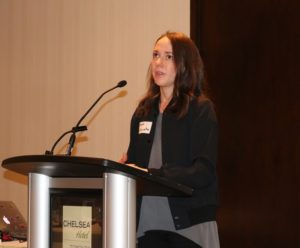Entrepreneurs meet to discuss and develop future program for Anishinabek Educational Institute

By Laura Barrios
TORONTO—Entrepreneurs and aspiring entrepreneurs, and those with an interest in business met at the Anishinabek Nation Entrepreneurship session in Toronto on March 27, in hopes of working together to begin the early stages of developing a business entrepreneurship program for the Anishinabek Educational Institute.
The event which was hosted by the Anishinabek Educational Institute (AEI), welcomed many keynote speakers. The opening speaker, the new Director of Education at the Union of Ontario Indians, Murray Waboose, spoke from personal experience when addressing the group of professionals.
“We captured a core group of people here today. Entrepreneurship starts in our community and those who have the courage to take an idea and run with it,” stated Waboose. “It’s difficult when you start…what brings a true entrepreneur in bringing success is the belief in themselves—the belief that they can overcome anything they face.”
Michelle Richmond-Saravia, owner of BeSuperior Consulting and member of Pic River First Nation, facilitated the session.
“The goal is to gather information to help build and support an appropriate curriculum for AEI, especially to include all of the voices and have them be heard,” she noted. “It will be asked of you to share your stories as women, Elders, youth, and men.”
Richmond-Saravia discussed other entrepreneurs such as Christi Belcourt, Ashley Richard, and Heather Dickson, all of which have faced challenges at every turn, yet have risen above and become Entrepreneur Warriors.
“I think that within us, we all carry that fire and that gift and it’s a combination of creativity, movement, and finding ones purpose,” explained Richmond-Saravia about Entrepreneur Warriors. “Being an Entrepreneurial Warrior is about being able to provide for your families and most importantly, helping to support our children so that they can realize their dreams and visions and reach their true potential…Entrepreneurs have to fly because they have a lot of people looking up to them to be leaders. So [Entrepreneurial Warriors are] always being forward thinkers and being innovative.”
The overall goal of the session was to hear feedback or testimonials from participants who have first-hand experience as entrepreneurs in order to raise awareness of challenges that varying demographics may face, and to share the successes.
“We’re trying to get the perspectives from different areas,” expressed Jennifer Fletcher, Acting Site Coordinator at the AEI Nipissing First Nation campus. “When it comes to program development, we usually get ‘I want to be able to operate my own business and want to know what I need to do’, so this program would help with that.”
The participants heard from youth keynote speaker Sara Cornthwaite, a freelance Video Producer and Editor, and member of Nipissing First Nation (NFN), who unintentionally discovered her passion, pursued it academically, and catapulted straight into the industry of Broadcast Media to make her mark.
“I’d call myself an entrepreneur now; but I definitely stumbled into it,” candidly remarked Cornthwaite. “It’s a scary thing being taught your pathways; but it’s even scarier seeing that path and not knowing what you want to do. You have to be passionate about what you do to make sure that you can be the best at it; if you don’t have passion about it, there are hundreds of others who will jump on that. You have to be able to do it day in and day out.
The NFN youth whose gift is capturing images of important moments and producing videos, has spent time with Indigenous communities all over the world and believes that video has the power to convey universal messages.
“We live in a world where we can create our own work,” stated Cornthwaite. “It means so much to me that as a youth, you can find your gift. That is so important because everyone has a gift. If you can take your passion and ideas and run with them, you’ll be very happy.”
The group discussed and established that all entrepreneurs face roadblocks and barriers, but aspiring entrepreneurial youth in particular face a multitude of challenges.
“As a youth, you lack experience to even write a business plan,” expressed participant Erin Chiblow of Mississauga First Nation. “Our youth have lots of ideas, but they don’t know what to do with them. They don’t have the life experience to bring them forward to do what it is they want to do. They need that support.”
Elder John Sawyer of Nipissing First Nation believes that entrepreneurship is using what resources and abilities are available.
“When we talk about entrepreneurs, we talk about physical self, but not spiritual connection. It doesn’t have to be a physical product, it can be a spiritual service. Your job shouldn’t be work; it should be a way of life,” stated Elder Sawyer. “A young kid can be a productive person; the product may not make them millionaires, but they will be able to live a balanced life and make a living.”
The contributions made by the participants of the Anishinabek Nation Entrepreneurship session will go into the development of the entrepreneur program intended to be developed by the AEI.
“Thank you all for committing time, knowledge, and information on how we can build an entrepreneurship program that’s ours, that’s Anishinabek, where we can better ourselves,” expressed Waboose. “Hopefully with some of the tools and shared stories and presentations today, it will provide additional insight and develop new ideas. Most important, I hope it inspires you to continue to pursue your dreams and to never give up.”
Other speakers included: Joe Endanawas, former Chief of Sheshegwaning First Nation; Leanna Farr, legal team member at the Union of Ontario Indians; Isidra Cruz, Ontario Arts Council South Representative; Brenda Doner, Connecting Communities Project Manager at Community Legal Education Ontario (CLEO); and Alex Weeks, Business Development Officer at Waubetek Business Development Corporation.

